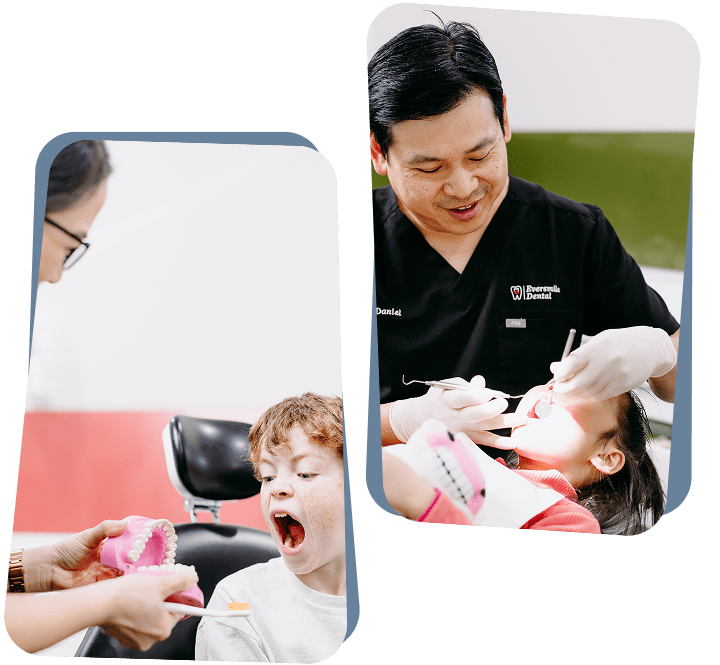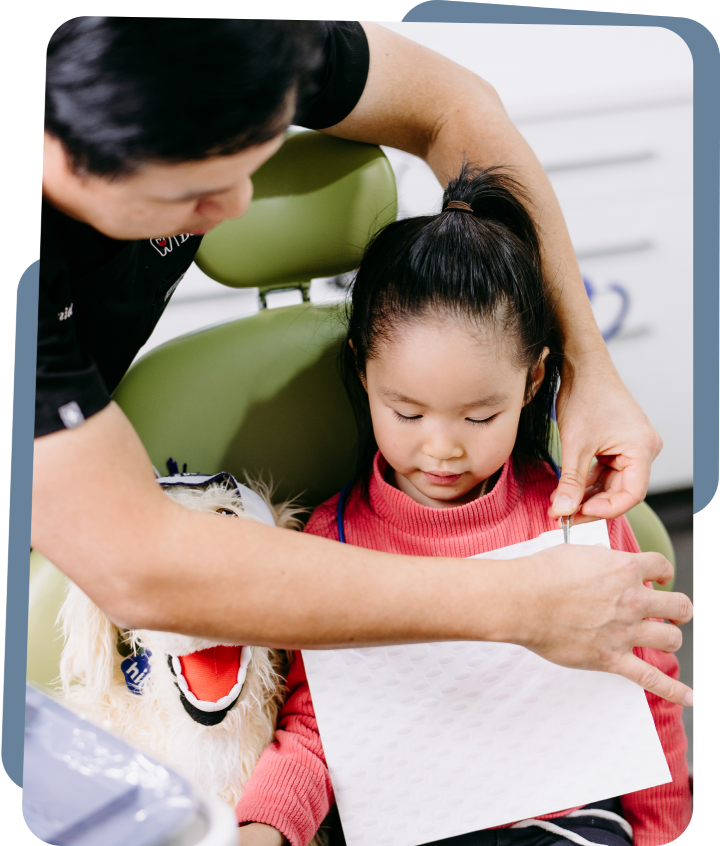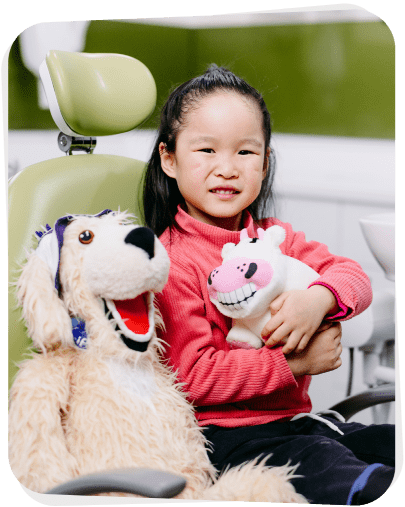Supporting Healthy Smiles from the Start
Your Child’s First Dental Visit
in Bunbury
Your child’s first dental visit in Bunbury introduces them to the dental environment in a supportive way. Our team explains each step to help children feel comfortable and prepared.

When Should Your Child First See the Dentist?
Why Early Dental Visits Matter
- Healthy Habits
Early visits encourage familiar routines, such as brushing and regular checkups. Children learn the importance of daily care through age-appropriate guidance, helping them become more familiar with future visits.
- Development Monitoring
Dental professionals can track tooth and jaw development from an early age. This helps identify spacing issues, enamel defects, or bite concerns while the mouth is still growing, when some concerns may be easier to manage.
- Decay Prevention
Regular checks allow early detection of plaque buildup, tooth decay, or gum irritation. Preventive care reduces the risk of complications and supports parents with guidance on dietary habits and oral hygiene.
- Comfort with Care
Children who visit the dentist early may become more familiar with future appointments. Exposure to the setting, sounds, and process can support familiarity and encourage gradual adjustment, helping children develop a sense of familiarity with dental care over time.


Preparing Your Child for a Positive Dental Experience
- Choose the Right Time
Children are often more settled when they’re well-rested and have eaten. Booking in the morning, when energy is usually higher, may help the visit run more smoothly and support a familiar first dental experience.
- Use Positive Language
Words matter more than we think. Try saying, “The dentist will count your teeth” instead of using words like “pain” or “needle.” A calm tone and age-appropriate language may support a child’s understanding of dental care.
- Bring Their Comfort Toy
A favourite toy or blanket can provide familiarity in a new setting. Familiar items help children adjust to the environment, offering comfort and giving them something familiar to focus on during the visit.
- Pack Essentials for the Visit
Being prepared can assist with your child’s visit. Bring your Medicare card, your child’s medical history, and any referral letters from a GP. Having everything available may assist the appointment process and avoid delays.
We Accept CDBS—Check Your Child’s Eligibility
Eligibility is determined by Medicare. You can confirm your child’s status before booking an appointment— or contact our team, and we can help check eligibility. No referral is needed; just bring your Medicare details.

Our Approach to Children’s Dentistry in Bunbury
-
- Local Dental Care for Bunbury Kids
- We’re part of the Bunbury community, and many of us are parents ourselves. That means we understand local families, schools, and what makes kids feel supported. Our team has provided consistent dental care to local families for many years and is here for the long haul.
-
- Providing Children’s Dental Care in Bunbury Since 2006
- For nearly 20 years, we’ve cared for Bunbury kids with kindness, patience, and clinical know-how. We continue to support local families across generations, offering consistent care in a familiar setting. Our goal is to maintain high standards and constructive visits.
-
- Encouraging Positive Dental Habits in Children
- Children’s dentistry is about more than teeth—it’s about establishing healthy habits and helping children feel comfortable in the dental chair. We aim to provide a welcoming environment tailored to children’s needs. Whether your child is chatty or shy, nervous or fearless, we tailor every appointment to them. Plus, we offer checkups for the whole family in one spot—easy and convenient.
-
- Patient, Child-Focused Dentistry
- Appointments are scheduled with time for children to feel comfortable and ask questions. We explain procedures in clear, age-appropriate ways and adjust to each child’s needs. Every family is different, so we take the time to listen, provide clear information, and work together to make visits calm and constructive from the beginning.
-
- Professional Care for Children’s Oral Health
- Eversmile Dental is guided by clear values and professional standards in children’s dentistry. We provide care that is appropriate for each stage of development, with an emphasis on clear communication and general well-being. Families can expect a consistent approach that prioritises comfort, safety, and continuity of care over time.
-
- Modern Technology for Children’s Dentistry
- We use tools such as EMS Airflow, intraoral scanners, and low-radiation imaging to assist with diagnosis and treatment planning. These technologies can support accuracy and efficiency in dental care, but are always used alongside professional clinical judgement. Technology is part of the approach we take to providing appropriate care for each child.
Frequently Asked Questions
Is it ever too early to start dental care?
Kids’ dental care in Bunbury can begin early, even before the first tooth appears. Early dental care isn’t just about brushing. It’s also about developing routines that support healthy teeth and gums as they develop. Here’s what dental care can look like in the early months:
- Wipe gums gently after feeds:
Carefully wipe your baby’s gums with a soft, damp cloth before teeth come through. This technique helps remove milk residue. - Avoid putting a baby to bed with a bottle:
Letting a baby sleep with milk or juice can increase the risk of early tooth decay once teeth appear. - Introduce a toothbrush when the first tooth erupts:
Use a small, soft-bristled brush with water to clean new teeth. Toothpaste is usually introduced around 18 months of age, depending on advice from your dental team. - Be mindful of sugary snacks and drinks:
Even toddlers are affected by sugar. Encourage water over juice and keep sweet treats occasionally.
What should I do if my child is scared of the dentist?
It’s common for children to feel nervous about visiting the dentist, especially if it’s their first time or they’ve had a difficult experience before. The most helpful approach is to help your child feel comfortable with dental visits. Here are some gentle, practical ways to support your child:
- Talk about the visit in a calm and positive way:
Use friendly words to explain what will happen, such as “The dentist will count your teeth” or “Look at your smile.” Avoid mentioning things like needles or pain. Even if you mean to comfort them, these words can increase anxiety. - Play pretend dental visits at home:
Role-play with a toothbrush and a toy mirror. Let your child take turns being both the dentist and the patient. This helps them understand what might happen and may help children understand what to expect. - Use storybooks or children’s shows:
Choose books or programs that show characters going to the dentist in a fun, relaxed way. Seeing others enjoy the experience may help children understand the process. - Book the appointment at a time that suits your child:
Avoid nap times or late afternoons. Many children do better in the morning when they’re rested and alert. - Bring something comforting:
A favourite toy, blanket, or even a sticker chart can offer familiarity during the visit. - Stay calm and confident yourself:
Children often take cues from their parents. Speaking calmly and smiling, even when you’re nervous, may help create a calm environment.
Can I stay with my child during the visit?
Yes, you can stay with your child during their dental visit, including their first dental visit in Bunbury. Your presence can help your child feel more comfortable, especially if they’re nervous or uncertain. The dentist may ask you to sit nearby, hold your child’s hand, or provide support throughout the appointment.
Staying close allows you to support your child and also gives you a chance to understand what happens during the visit. If you’re uncertain how to help, the dental team will guide you through what to expect.
Will my child get a checkup or treatment at the first visit?
At the first visit, most children will receive an initial checkup rather than any treatment unless a concern is found. The appointment is focused on introducing your child to the dental setting at their own pace. Here’s what usually happens during the visit:
- A brief look inside the mouth:
The dentist may count your child’s teeth and check the gums, bite, and early tooth development. - Discussion with parents:
You’ll be asked about feeding, brushing, thumb-sucking, dummies, and anything else affecting your child’s oral health. - Tips for daily care:
The dentist may suggest caring for baby teeth, managing teething, or selecting a suitable toothbrush for your child’s age. - Treatment only if needed:
If something urgent is found, such as early decay or an injury, the dentist will explain the next steps clearly and calmly. - Time to build comfort:
The visit also gives your child time to look around, sit in the chair, and become familiar with the environment.
When should children start brushing their teeth?
Children should start brushing when their first tooth appears, usually around six to ten months of age. Even one baby tooth can develop decay, so it’s recommended to introduce brushing early as part of their daily routine. Here’s what that process typically looks like:
- Start with a soft-bristled baby toothbrush and water:
Gently brush twice daily using only water until about 18 months. After that, introduce a rice-sized amount of low-fluoride toothpaste unless your dentist recommends otherwise. - Supervise brushing until age 7:
Young children often lack the coordination to brush thoroughly, so parental help is vital during the early years. - Make brushing part of a consistent routine:
This can support the development of healthy habits.
What toothpaste should I use for my baby or toddler?
How often should a child visit the dentist?
In most cases, it is usually advised that children visit the dentist every six to twelve months, starting from their first birthday or first tooth. When it comes to children’s dentistry in Bunbury, the recommended frequency may vary depending on your child’s age, oral health, and risk of tooth decay. Some children may require more frequent monitoring, especially if there’s a history of early cavities, thumb-sucking, or crowding. Your dental provider will recommend an appropriate schedule for your child and adjust it over time as needed.
Are dental X-rays necessary for young children?
Dental X-rays are not routinely taken at every visit. They may be recommended if a concern can’t be seen with the eye alone, such as when assessing an injury. Dentists only recommend X-rays when the potential benefits outweigh the risks and the information gained is clinically relevant to making treatment decisions.
Modern dental X-rays use low radiation doses, and protective measures such as lead aprons are applied to help reduce exposure. If your child does need X-rays, the dentist will explain why they’re recommended and answer any questions you may have.
Can a dentist take care of cavities in toddlers?
Yes, dentists can provide appropriate care for cavities in toddlers using approaches suited to your child’s age and development. The treatment depends on the cavity’s size and stage. Options may include:
- Monitoring the tooth with dietary and brushing advice to assist in managing early-stage decay. This may include reducing sugary snacks, offering water instead of juice, and brushing twice daily with low-fluoride toothpaste.
- If active treatment is required, the dentist may recommend a filling to remove the damaged area and protect the tooth.
Appointments are adapted to introduce toddlers to care at their own pace. The dentist will clearly explain any recommended care and proceed if it’s appropriate for your child.
Do baby teeth really matter if they fall out?
Yes, the timing of baby tooth loss can be important. Although they’re temporary, baby teeth have an important role in guiding adult teeth into the proper alignment. If baby teeth fall out too early due to decay or injury, nearby teeth may shift into the space, making it harder for adult teeth to erupt properly. Early tooth loss can also affect chewing, speaking, and alignment.
Caring for baby teeth helps prevent early tooth loss and supports healthy oral development. while adult teeth are forming beneath the gums.
Is sedation dentistry safe for 2-year-olds?
Sedation may be considered appropriate for young children in specific situations, but it’s only recommended when necessary and under strict clinical protocols. Dentists follow guidelines and work with trained professionals to assess your child’s health, needs, and medical history before considering sedation. If sedation is recommended, the dentist will explain the risks and benefits, the type of sedation used, and how your child will be monitored before, during, and after the appointment.
For children around two years of age, sedation is usually reserved for cases where treatment is urgent, the child cannot tolerate care while awake, or the procedure is complex. For example, sedation may be considered if a child has multiple large cavities causing pain, has severe dental anxiety that prevents cooperation or requires a surgical procedure such as the removal of a damaged tooth.
Various Payment Options Available
Book Your Appointment Online or Call Our Bunbury Dental Clinic
Book an appointment with our dentist in Bunbury to discuss your oral health needs. We provide tailored dental treatments and clear information to support informed decisions about your dental care.
